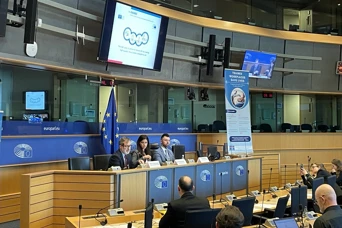Advocacy
In 2024, the ERC took important steps to advance the advocacy work, aiming to increase survival rates from sudden cardiac arrest (SCA) across Europe. Beyond raising awareness, we are committed to driving policy changes that equip more people to act when it matters most.
Launch of the AWARE Coalition
A major highlight was the creation of the Alliance for Workplace Awareness and Response to Emergencies (AWARE). Led by the ERC and supported by several members and supporting organisations, AWARE’s goal is to ensure workplaces are better prepared for sudden cardiac arrest, with more access to AEDs and CPR training. We are calling for an update of the EU Health and Safety at Work Framework Directive to reflect modern emergency preparedness needs. The initiative officially launched at the European Parliament in January 2025, where policymakers, experts, and advocates came together to push for stronger workplace standards.
Youth Advocacy and Toolkit
The ERC also placed a strong emphasis on youth engagement by developing a new Toolkit for Youth CPR Education Initiatives. This resource is designed to support National Resuscitation Councils (NRCs) in promoting local advocacy efforts, offering good practices and practical strategies to advance CPR education among young people. The toolkit aims to empower a new generation of confident life-savers across Europe. Click here to download the full toolkit now.
Advocacy on the Driving Licence Directive
Throughout the year, we continued advocating for the inclusion of mandatory CPR training in the revision of the European Driving Licence Directive. We engaged with policymakers and submitted our recommendations, emphasizing how simple training for new drivers could significantly improve bystander intervention rates. In 2025, the European Union formally adopted new minimum requirements for new drivers in the Driving License Directive.
Continued Work in the EACH Coalition
We continued our active involvement in the European Alliance for Cardiovascular Health (EACH), working closely with partner organisations to keep sudden cardiac arrest on the EU health agenda and support broader cardiovascular health improvements.
Looking Ahead
In the coming years, the ERC will build on the foundations laid in recent years to further strengthen its role as a leading voice in resuscitation advocacy. The AWARE Coalition will continue to grow, bringing together more organisations and policymakers to ensure that lifesaving preparedness becomes the standard across Europe. At the same time, the annually updated Toolkit will support National Resuscitation Councils in launching campaigns that inspire and empower the next generation of life-savers.
Our policy efforts will also remain a top priority. Following the success of integrating CPR training into the Driving Licence Directive, we will continue to push for updates to the Health and Safety at Work Directive so that emergency preparedness is firmly embedded in European workplace standards. Alongside this, we will deepen our collaboration with the European Alliance for Cardiovascular Health (EACH) and other partners, ensuring that sudden cardiac arrest is consistently recognised as a critical public health issue within broader cardiovascular strategies.
